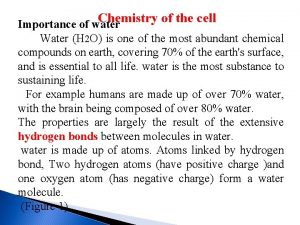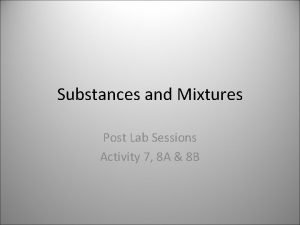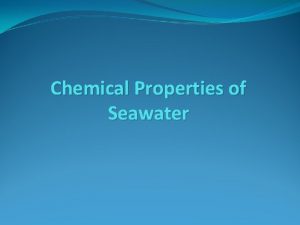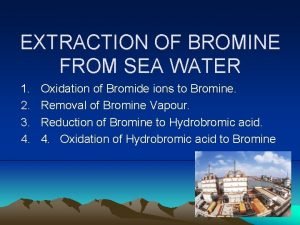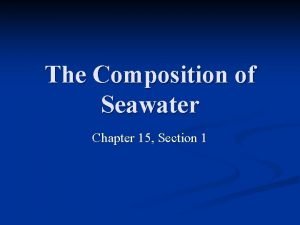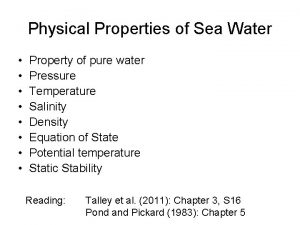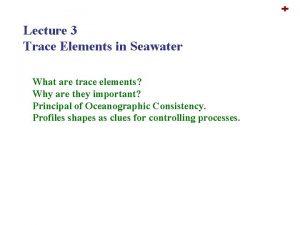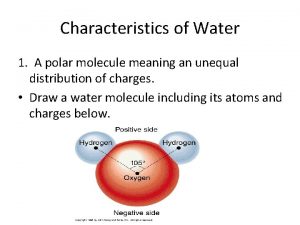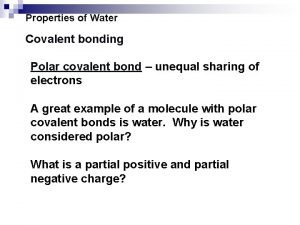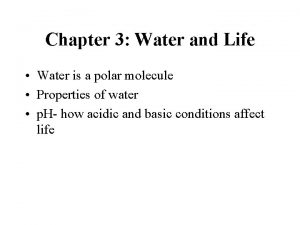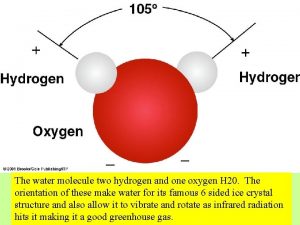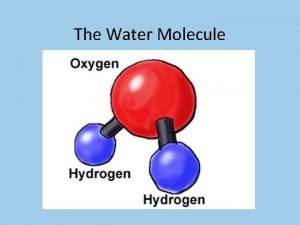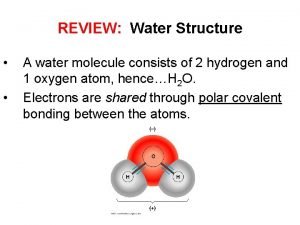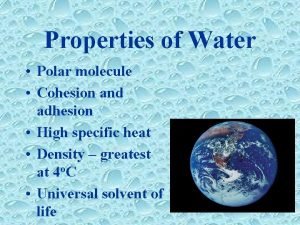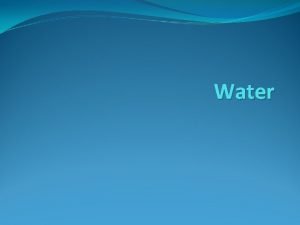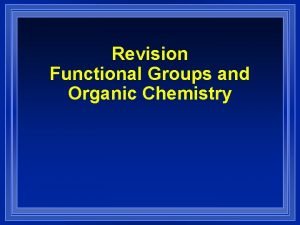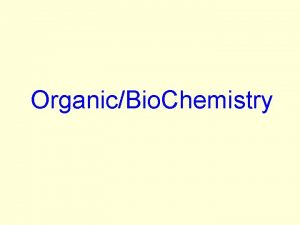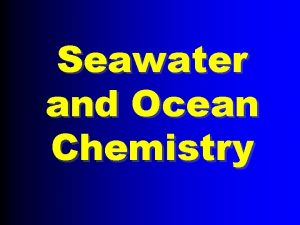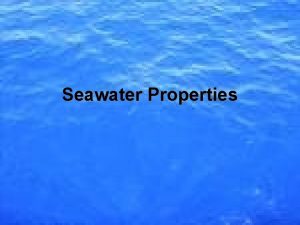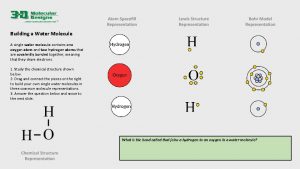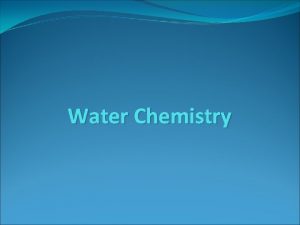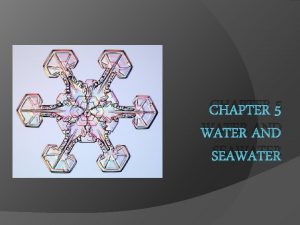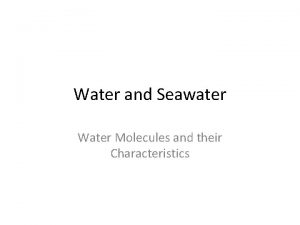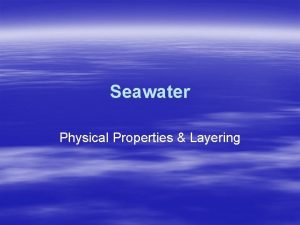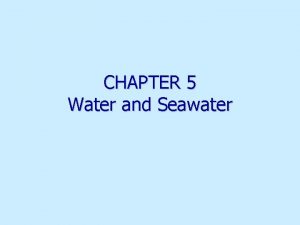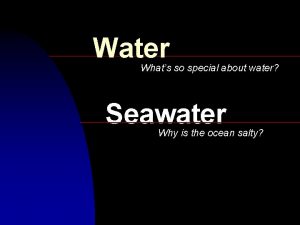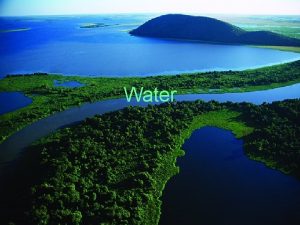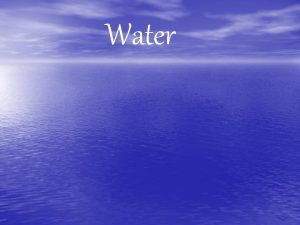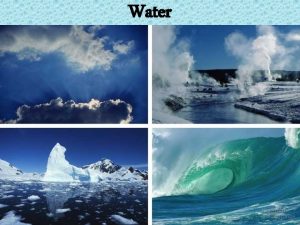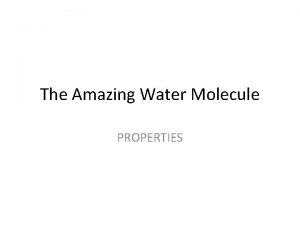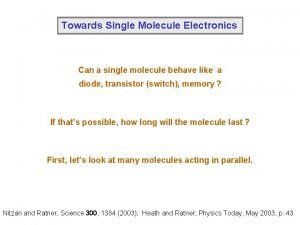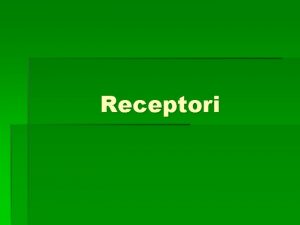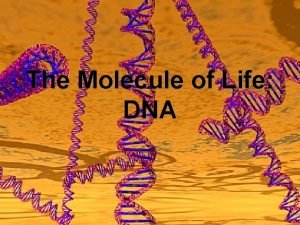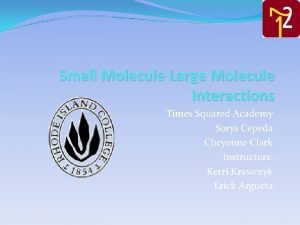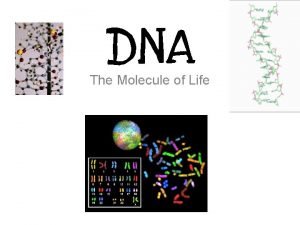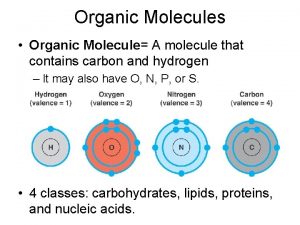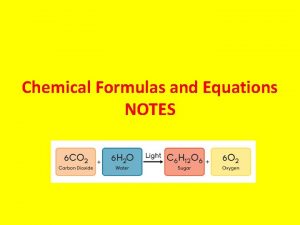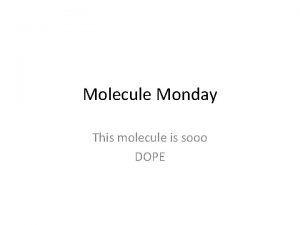Seawater Chemistry The Water Molecule z Water is










































- Slides: 42

Seawater Chemistry

The Water Molecule z. Water is a compound and compounds are made up of two or more elements. z. An element is a substance of identical particles, called atoms. z. Atoms can not be broken into simpler substances by chemical means.

The Water Molecule z. Atoms have a nucleus which is made up of protons and neutrons. z. Protons are positively charged particles and have a mass of one atomic weight unit. z. Neutrons have no electrical charge, but they also have a mass of one atomic weight unit.

The Water Molecule z. In addition to the protons and neutrons in the nucleus atoms also have electrons orbiting around the nucleus. z. The electrons are negatively charged, but their mass is negligible, not even one atomic weight unit. In most discussions of atoms the mass of electrons is not even considered.

The Water Molecule z. Atoms are electrically neutral, therefore there as many electrons orbiting the nucleus as there are protons in the nucleus of the atom.

The Water Molecule z. A water molecule is made from two atoms of hydrogen and one atom of oxygen. z. A molecule is a group of atoms held together by chemical bonds. z. Chemical bonds are formed when electrons are shared or transferred between atoms.


The Water Molecule z. A water molecule forms when electrons are shared between two hydrogen atoms and one oxygen atom. z. The bonds formed by shared pairs of electrons are known as covalent bonds. z. In water the angle formed by the two hydrogen atoms and the central oxygen atom is about 105 -degrees.

The Water Molecule

The Water Molecule z. Hydrogen bonds greatly influence the properties of water. z. The allow individual water molecules to stick together. We call this cohesion. z. Cohesion gives water a high surface tension, which gives water a “skin” capable of supporting a razor blade or a tiny walking insect.

The Water Molecule z. Adhesion is the tendency of water to stick to other materials, this allows water to adhere to solids and make them wet. z. Cohesion and adhesion cause capillary action, the tendency for water to spread through a towel when one end is dipped in water.

The Water Molecule z. Water is a powerful solvent. It will eventually dissolve almost any substance. z. Water’s dissolving power results from the polar nature of the water molecule. z. When water dissolves sodium chloride (Na. Cl) the result is that Na+ ions and Clions are surrounded by water molecules.

The Water Molecule z. An ion is an atom that has an unbalanced electrical charge because it has either gained or loss one or more electrons. z. Sodium chloride is not covalently bounded. There is no sharing of electrons between sodium and chlorine.



The Water Molecule z. Salts and other dissolved molecules can move through still water by a process called diffusion. z. Diffusion is the movement of molecules from an area of higher concentration of those molecules to an area of lower concentration of those molecules.

Seawater z. The ocean’s salinity varies from about 3. 3% to 3. 7% by weight. z. The average salinity is usually given as 3. 5% or 35 parts per thousand (0/00). z. Most of the dissolved salts in the ocean have been separated into ions. The most abundant of these are sodium and chloride.

Seawater z. As the salinity increases, the freezing point of water becomes lower; the salts act as a sort of antifreeze. Therefore sea ice forms at a lower temperature than freshwater lakes. z. Dissolved salts tend to attract water molecules. Therefore seawater evaporates more slowly than freshwater.

Seawater z 3. 5% of seawater consists of dissolved substances. z. If we were to boil away 100 kilograms of seawater we would be left with a residue weighing 3. 5 kilograms. z. Oceanographers prefer to use parts per thousand notation rather than percent (parts per hundred).

Seawater

Seawater z. Residence Time z. The constancy of the ocean seems to suggest that ions are being added to the ocean at the same rate they are removed. z. Ions are removed by precipitating out and becoming part of the sediments on the ocean bottom

Seawater z. Or by being extracted from seawater by animals and plants and used to form skeletal materials as well as being used in metabolic processes. z. The residence time is equal to the amount of an element in the ocean divided by the rate at which it is added (or removed).

Seawater

Seawater z. Dissolved Gases z. Most gases in the air readily dissolve in seawater ant the ocean’s surface. z. Plants and animals living in the ocean need these gases. z. No marine animal has the ability to break down water molecules to obtain oxygen directly.

Seawater z. Acid-Base Balance z. Water can separate to form hydrogen (H+) ions and hydroxyl (OH-) ions. z. In pure water, these two ions are present in equal amounts. z. An imbalance in the ions produces either an acidic or basic solution.

Seawater z. An acid is a substance that releases a hydrogen ion in solution. z. A base is a substance that combines with a hydrogen ion in solution. z. Acidity or alkalinity of a solution is measured in terms of the p. H scale.

Seawater z. The p. H scale measures the concentration of hydrogen ions in a solution. z. An excess of hydrogen (H+) ions makes the solution acid. z. An excess of hydroxide (OH-) ions makes the solution alkaline. z. Neutral is in the middle of the scale at 7.


Seawater z. Seawater is slightly alkaline with an average p. H of about 8. z. At first this sounds odd because there are large amounts of carbon dioxide dissolved in the ocean. Dissolved carbon dioxide combines with water to from carbonic acid.

Seawater z. Some carbonic acid brakes down to produce hydrogen ions, bicarbonate ions, and carbonate ions. z. The net effect of the bicarbonate and carbonate ions is to buffer seawater.

z. If you want to see how much you remember a quiz follows. z. The answers follow each question or set of questions, so write your answers on a blank sheet of paper.

Quiz z 1. When an atom gains an additional electron it becomes: y a. An atom y c. A molecule b. An ion d. A quark

Answer z 1. Ion

Quiz z 2. The oxygen and hydrogen atoms in the water molecule are held together by: ya. Covalent bonds. Ionic bonds yc. Ester bonds d. Hydrogen bonds z 3. When hydrogen bonds form between adjacent water molecules they form a “skin” which allows the water to support a razor blade. This is called: ya. adhesion b. capillary action yc. cohesion d. tension

Answers z 3 a. Covalent bonds z 4. C. cohesion

Quiz z 5. Water is: ya. A good solvent yb. A poor solvent yc. A moderately good solvent yd. A very poor solvent z 6. Pure water is: ya. A good conductor of electricity yb. A poor conductor of electricity

Answers z 5. a. good solvent z 6. b. A poor conductor

Quiz z 7. The average salinity of the open ocean is: ya. 10 ppt. yc. 35 ppt. b. 25 ppt. d. 55 ppt. z 8. True or false. Ice forms at a lower temperature in fresh water than in salt water.

Answers z 7. C. 35 ppt. z 8. False

Quiz z 9. The most abundant ion in seawater is: xa. Magnesium xc. Sodium z 10. b. Chloride d. Sulfate The average p. H of seawater is: xa. 6. 2 xc. 7. 5 b. 7 d. 8. 2

Answers z 9. z 10. b. Chloride D. 8. 2

z. The End
 Water and water and water water
Water and water and water water Boiling point of seawater
Boiling point of seawater Chemical properties of seawater
Chemical properties of seawater Bromine in seawater
Bromine in seawater Composition seawater
Composition seawater Physical properties of sea water
Physical properties of sea water Trace elements in seawater
Trace elements in seawater Water molecule evaporation
Water molecule evaporation Polar molecule meaning
Polar molecule meaning Water molecule
Water molecule Polar covalent bond
Polar covalent bond Polar covalent bond in water molecule
Polar covalent bond in water molecule Water molecule
Water molecule Water molecule
Water molecule Water molecule structure
Water molecule structure Polarity and cohesion
Polarity and cohesion Water is a polar molecule
Water is a polar molecule Ib organic chemistry
Ib organic chemistry Inorganic chemistry vs organic chemistry
Inorganic chemistry vs organic chemistry Hát kết hợp bộ gõ cơ thể
Hát kết hợp bộ gõ cơ thể Bổ thể
Bổ thể Tỉ lệ cơ thể trẻ em
Tỉ lệ cơ thể trẻ em Chó sói
Chó sói Tư thế worms-breton
Tư thế worms-breton Chúa yêu trần thế alleluia
Chúa yêu trần thế alleluia Môn thể thao bắt đầu bằng chữ đua
Môn thể thao bắt đầu bằng chữ đua Thế nào là hệ số cao nhất
Thế nào là hệ số cao nhất Các châu lục và đại dương trên thế giới
Các châu lục và đại dương trên thế giới Cong thức tính động năng
Cong thức tính động năng Trời xanh đây là của chúng ta thể thơ
Trời xanh đây là của chúng ta thể thơ Mật thư tọa độ 5x5
Mật thư tọa độ 5x5 Làm thế nào để 102-1=99
Làm thế nào để 102-1=99 Phản ứng thế ankan
Phản ứng thế ankan Các châu lục và đại dương trên thế giới
Các châu lục và đại dương trên thế giới Thơ thất ngôn tứ tuyệt đường luật
Thơ thất ngôn tứ tuyệt đường luật Quá trình desamine hóa có thể tạo ra
Quá trình desamine hóa có thể tạo ra Một số thể thơ truyền thống
Một số thể thơ truyền thống Cái miệng nó xinh thế
Cái miệng nó xinh thế Vẽ hình chiếu vuông góc của vật thể sau
Vẽ hình chiếu vuông góc của vật thể sau Nguyên nhân của sự mỏi cơ sinh 8
Nguyên nhân của sự mỏi cơ sinh 8 đặc điểm cơ thể của người tối cổ
đặc điểm cơ thể của người tối cổ V. c c
V. c c
